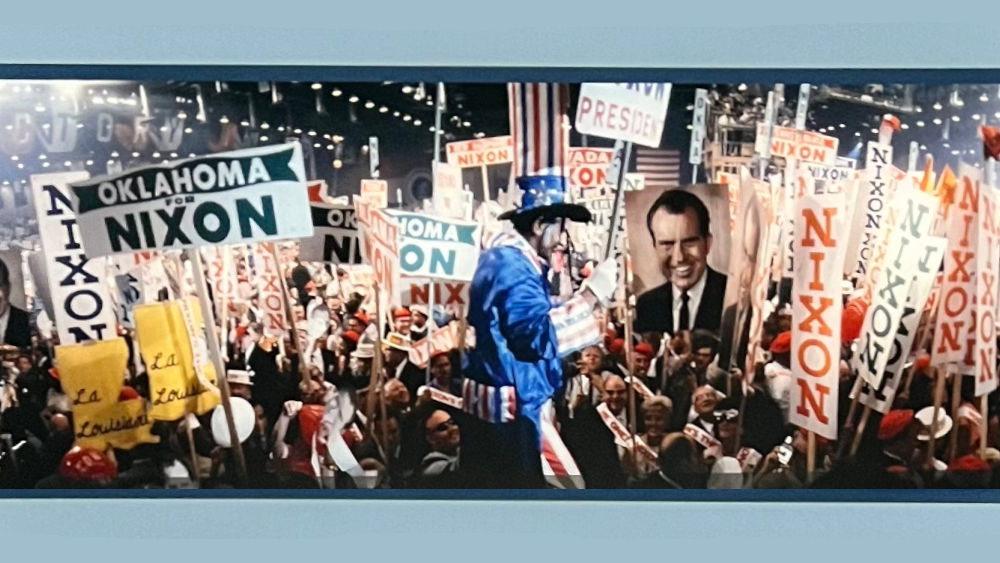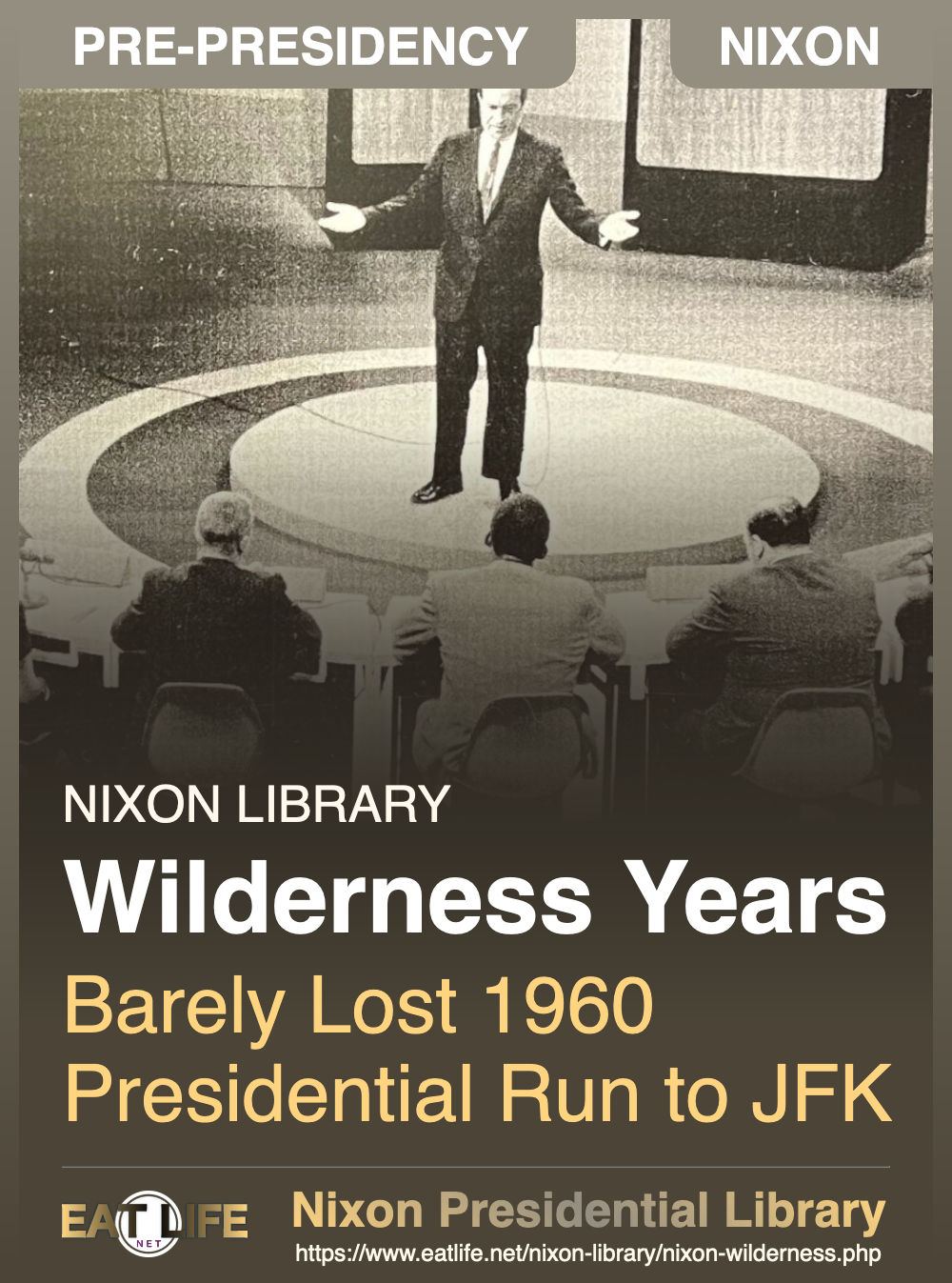In 1960, after eight years as Vice President, Nixon emerged as the standard-bearer of the Republican Party, ready to step into history as the 35th President of the United States.
Instead, the years between 1960 and 1968 would prove to be among the most challenging times in Nixon's life. After suffering the one-two punch of losing the Presidency to Kennedy in 1960 and the California gubernatorial election to Pat Brown in 1962, Nixon's political career seemed to be over. Six years later, after one of the most remarkable comebacks in American political history, he was elected President.

The nationwide broadcast of the first Nixon-Kennedy TV debate on September 26th, 1960, was a significant first for American Presidential elections. An unprecedented 80 million people watched on television.
Coming off a hectic campaign schedule and a two-week hospitalization after injuring his knee, Nixon arrived at the first debate looking drawn and pale alongside his tanned and well-rested opponent.
The majority of TV viewers reportedly thought that Kennedy won the debate, while most radio listeners considered Nixon the winner. Those first debates taught Nixon some valuable lessons that he never forgot.


Later in the decade, he would use appearances on shows like The Jack Paar Program and Laugh in to give viewers a new look at his personality and policies. In his 1968 campaign, Nixon's televised town hall-style. "Man in the Arena" forums became a major asset that demonstrated his poise, experience, and mastery of the issues.
After months of intense campaigning in every one of the 50 states, Nixon lost to Kennedy by just 112,803 votes out of nearly 69 million cast - one of the narrowest margins in Presidential election history.

- Monogrammed Briefcase
Belonging to Richard Nixon - Shoes
These well worn shoes carried Nixon through his rigorous campaign schedule in which he carried out his campaign pledge to visit all 50 states. - 1960 Nixon Presidential Campaign Ephemera
Nixon lost the national popular vote by only 0.1% - the closest popular vote margin of the 20th century.
In the aftermath of the 1960 election loss, the Nixon's moved back to Southern California where the former Vice President took a position at a Los Angeles law firm.
Several of Nixon's friends encouraged him to write a book after he returned to California.
- Six Crises, the first of 10 books he would write, became a national bestseller.
Six Crises explored the six life-defining moments in his career to that point:
- The Hiss Case
- The Fund Crisis
- Eisenhower's Heart Attack
- The South American Trip and Caracas
- The Kitchen Debate with Khrushchev
- The 1960 election
This book is an account not of great men but rather of great events - and how one man responded to them.
- Six Crises Intro 1962
After his return to California. Nixon was determined to stay relevant and influential in politics. In 1962 he decided to run for Governor of California against the popular incumbent Pat Brown.
- As the former Presidential nominee and nominal leader of the Republican Party, Nixon's national appeal was still strong, and he had carried his home state in the 1960 election.
The political obituary of Richard Nixon
- The morning after his loss to Pat Brown, Nixon walked into the press conference where an aide was reading his concession statement.
Just think how much you're going to be missing. You won't have Nixon to kick around anymore, because, gentlemen, this is my last press conference.
- November 7, 1962
His impromptu outburst was a scathing critique of the press for what he and others viewed as their unfair treatment of him during that campaign as well as throughout his career.
Nixon's interest in foreign policy and his advocacy of constructive U.S. influence continued even while he was out of office. He maintained his high profile abroad even while he slowly began rebuilding his political capital at home.
- In the years between the 1962 and 1968 elections, Nixon took several extensive international trips. Even when traveling for clients of his law firm, he also made a point of meeting with the leaders of the countries he visited and holding press conferences to talk about everything from the war in Vietnam to the 1964 election.
In 1963 the Nixon family moved from California to New York City. Nixon became a partner in a prestigious law firm. In 1967 he argued a case before the U.S. Supreme Court. Many of Nixon's legal clients had international interests, and he was able to combine his passion for foreign policy and world affairs with his successful legal career.
One of the most important elements of Nixon's strategy to rebuild his political career was his vigorous campaigning for fellow Republicans in the 1964 and 1966 elections.
- Campaigning for Presidential nominee Barry Goldwater and stumping for numerous Congressional candidates, Nixon built a network of loyal supporters whose backing would be essential in winning the 1968 Republican nomination.

- Nixon shakes hands with California GOP candidates for Governor and Senator. Ronald Reagan and George Murphy. Both were former Hollywood stars.
What I would describe as the wilderness syndrome is experienced by anyone who suffers a major defeat in life.
- In The Arena

As a lifelong student of great leaders, Nixon particularly admired France's Charles de Gaulle and Britain's Winston Churchill. He considered their lives of statesmanship, service, and dedication to be sources of ongoing inspiration.
Perhaps what resonated most deeply with Nixon was that both men had endured crushing defeats and had to overcome seemingly insurmountable obstacles on their separate journeys back to greatness.
- From the day he resigned as Chancellor of the Exchequer in 1929 to the day he became Great Britain's Prime Minister in 1940, Churchill never gave up.
- Similarly, de Gaulle, after having stepped away from government for more than a decade, was finally swept back into power on his own terms.

In 1964 a divided Republican Party and a country united in support of President Johnson after President Kennedy's tragic assassination meant that the Republican Presidential candidate Barry Goldwater had little chance of winning.
- The activities of Nixon's eight "Wilderness Years" came together in a surprising way to build his comeback.
Despite the long odds, and with many other Republican leaders and officials jumping ship. Nixon was a dynamo of enthusiasm and commitment. Although the Republicans suffered disastrous defeats, Nixon emerged from the fray as a loyal and stalwart party leader.
Two years later, with support for President Johnson waning, the Republicans - and Nixon - saw an opportunity to gain back some of that lost ground in Congress. Nixon traversed the country during the 1966 off-year campaign, sometimes speaking several times a day for as many Republican candidates.
Nixon also made sure to build his public profile through newspaper and magazine articles that showed his savvy, and with television appearances that softened and reshaped his public persona.
World travels - including a four-continent tour in 1967 - added to his international profile and kept him in front of the media, where he could comment on ongoing issues from trade to the war in Vietnam.










